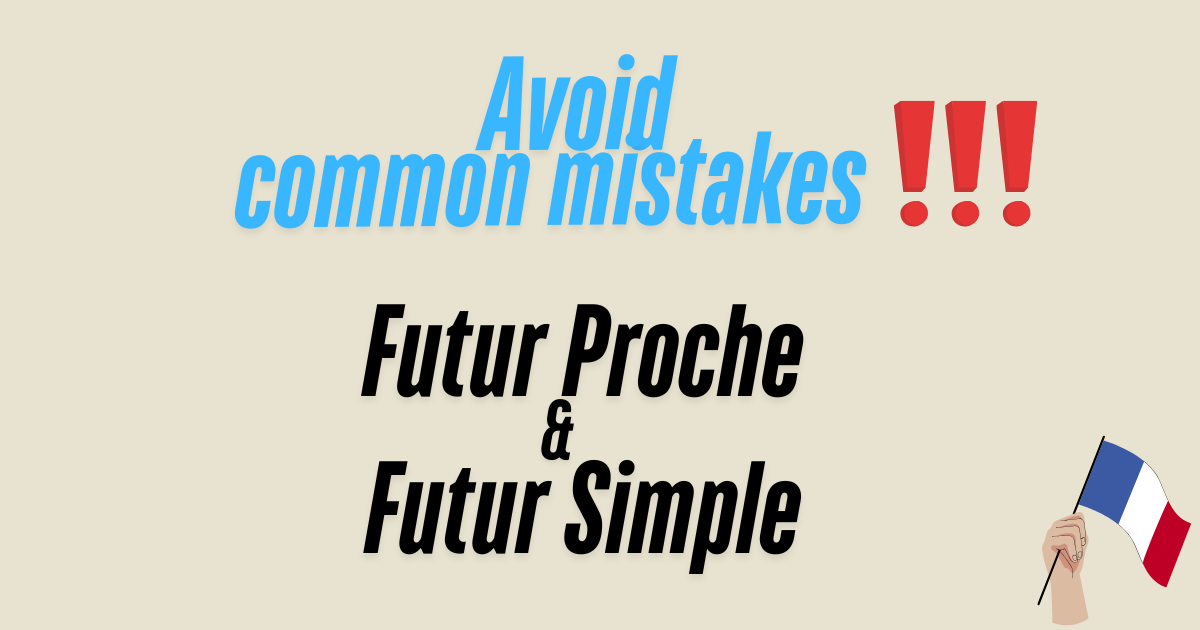Avoiding Common Mistakes with Futur Proche and Futur Simple in French (And How to Get Them Right)
Introduction
In French, both futur proche and futur simple are essential for discussing future events, but they are not interchangeable. Many learners find it challenging to decide which one to use in different situations. This post will break down the differences between these tenses, highlight common errors, and provide tips to help you master their usage.
Section 1: Understanding the Difference Between Futur Proche and Futur Simple
Futur Proche (Near Future):
- Purpose: Use futur proche to talk about actions or events that are imminent or planned to happen soon. It’s formed by combining the verb aller (to go) with the infinitive of the main verb.
- Example: Je vais manger dans cinq minutes. (I’m going to eat in five minutes.)
- When to Use It: Ideal for expressing something that is almost certain to happen in the near future or something you’ve planned.
Futur Simple (Simple Future):
- Purpose:Futur simple is used for actions or events that will happen in the more distant future or for making predictions. It’s formed by adding specific endings to the infinitive of the verb.
- Example: Je mangerai plus tard. (I will eat later.)
- When to Use It: Best suited for talking about events that are further away in time, less certain, or when a more formal tone is required.
Section 2: Common Mistakes and How to Avoid Them
Mistake 1: Using Futur Simple for Immediate or Near-Future Events
- The Problem: Learners sometimes overuse futur simple for events that are about to happen, even though futur proche would be more appropriate.
- Incorrect: Je mangerai dans cinq minutes. (I will eat in five minutes.)
- Correct: Je vais manger dans cinq minutes. (I’m going to eat in five minutes.)
- Why: Futur proche is better suited for imminent actions or plans, as it’s more natural in everyday conversation.
- How to Avoid It: For events happening soon or things you’ve already planned, use futur proche. Reserve futur simple for actions that are farther in the future or predictions.
Mistake 2: Using Futur Proche for Distant Future or Hypothetical Events
- The Problem: Sometimes learners use futur proche when talking about distant or uncertain future events, where futur simple would be a better fit.
- Incorrect: Dans 10 ans, je vais acheter une maison. (In 10 years, I’m going to buy a house.)
- Correct: Dans 10 ans, j’achèterai une maison. (In 10 years, I will buy a house.)
- Why: Futur simple is preferred for actions or events that are farther in the future or less certain.
- How to Avoid It: When talking about something planned for the distant future or hypothetical scenarios, opt for futur simple.
Mistake 3: Mixing Up Formality and Context
- The Problem: Learners sometimes fail to recognize that futur simple is often more formal, while futur proche is typically used in casual conversation.
- Incorrect (Formal situation): Monsieur, vous allez signer le contrat demain ? (Sir, are you going to sign the contract tomorrow?)
- Correct (Formal situation): Monsieur, signerez-vous le contrat demain ? (Sir, will you sign the contract tomorrow?)
- Why: Futur simple is preferred in formal or written contexts, while futur proche is more conversational.
- How to Avoid It: In formal settings (e.g., business meetings, academic writing), stick with futur simple. In everyday conversations, especially about the near future, use futur proche.
Mistake 4: Overusing Futur Simple for Predictions About the Immediate Future
- The Problem: Learners often use futur simple for making predictions about the immediate future, where futur proche would sound more natural.
- Incorrect: Il pleuvra cet après-midi. (It will rain this afternoon.)
- Correct: Il va pleuvoir cet après-midi. (It’s going to rain this afternoon.)
- Why: Predictions about the near future, especially when based on current evidence, are better expressed with futur proche.
- How to Avoid It: When predicting something based on present circumstances, use futur proche. Reserve futur simple for more distant or uncertain predictions.
Mistake 5: Limiting Futur Proche to Immediate Actions
- The Problem: Some learners believe that futur proche can only be used for actions happening right away, but it’s also suitable for informal speech about the near future.
- Incorrect (overthinking): Je mangerai bientôt. (I will eat soon.)
- Correct (natural, informal): Je vais manger bientôt. (I’m going to eat soon.)
- Why: Futur proche can be used more flexibly, not just for immediate actions but also for informal statements about events happening soon, even without a precise time frame.
- How to Avoid It: Don’t limit futur proche to immediate actions; it’s perfect for informal, near-future intentions as well.
Section 3: Key Differences Between Futur Proche and Futur Simple
| Futur Proche | Futur Simple |
| Used for events happening soon or in the near future. | Used for events happening further in the future or for predictions. |
| Formed with aller + infinitive (e.g., je vais faire). | Formed by conjugating the verb in the future tense (e.g., je ferai). |
| Common in spoken, informal French. | More formal, used in writing and polite speech. |
| Implies something is likely or certain to happen soon. | Used for events that are more distant, uncertain, or hypothetical. |
Section 4: Practical Tips to Master Futur Proche and Futur Simple
- Focus on Time Frame:
- If the action is happening soon, use futur proche.
- Example: Je vais partir bientôt. (I’m going to leave soon.)
- If the action is distant or you’re making a prediction, use futur simple.
- Example: Je partirai en vacances l’année prochaine. (I will go on vacation next year.)
- If the action is happening soon, use futur proche.
- Think About Certainty:
- Use futur proche when the action is certain or planned.
- Example: Je vais acheter du pain. (I’m going to buy bread.)
- Use futur simple for predictions or hypothetical situations.
- Example: Un jour, je visiterai le Japon. (One day, I will visit Japan.)
- Use futur proche when the action is certain or planned.
- Mind the Context:
- In formal situations, like business meetings or academic writing, opt for futur simple.
- In informal conversations, especially for near-future actions, use futur proche.
- Practice with Examples:
- Write or speak sentences about your immediate plans using futur proche, and about distant plans or dreams using futur simple. This will help reinforce the differences.
- Example (Futur Proche): Ce soir, je vais regarder un film. (Tonight, I’m going to watch a movie.)
- Example (Futur Simple): Dans dix ans, je vivrai peut-être à l’étranger. (In ten years, I may live abroad.)
- Write or speak sentences about your immediate plans using futur proche, and about distant plans or dreams using futur simple. This will help reinforce the differences.
Conclusion
Mastering the difference between futur proche and futur simple is essential for sounding natural and fluent in French. Futur proche is perfect for casual conversations about the near future, while futur simple is more suited for distant plans, predictions, or formal speech. By practicing and paying attention to context, you’ll become more confident in using both tenses effectively.




